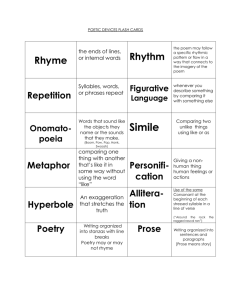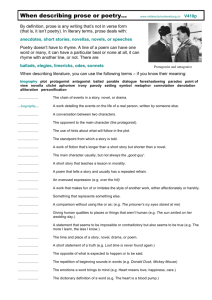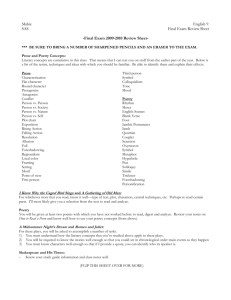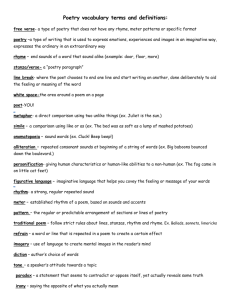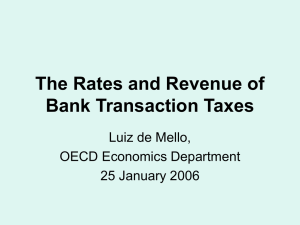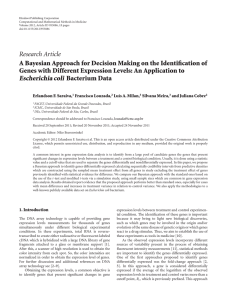Poetry Unit - Brain
advertisement
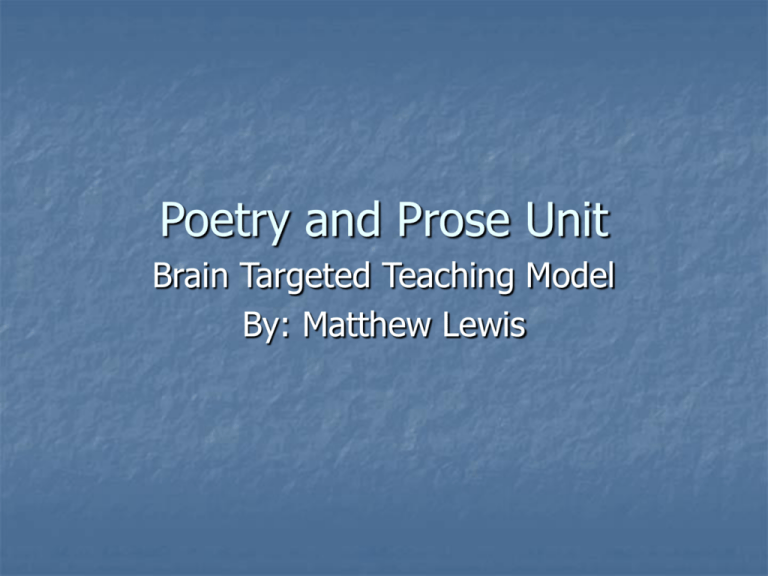
Poetry and Prose Unit Brain Targeted Teaching Model By: Matthew Lewis BTT 1: Emotional Climate This 7th grade unit in poetry focuses on the different ways a poet expresses themselves and how poetry can be structured to add meaning. Students will be encouraged to express themselves in by drawing on meaningful, personal experiences. Students may be hesitant to express themselves in an open forum. BTT 1: Emotional Climate The following will be implemented by the teacher to ensure a safe and positive learning environment: modeling of how to use personal experiences in writing. support positive, specific and personal feedback on student ideas and work by teacher and students (using the “what I like about it…..” model). use meet the author activities to teach diversity, adversity, acceptance. implement positive behavior rewards, student of the week, and classroom procedures. provide students several ways to demonstrate and present their learning. BT 1: My Poetry example to students My Special Gift Title: BTT 2: Physical Environment Arrange students desks in a circular, conference style to promote collaboration. Student background knowledge displayed in “gallery walk”. Color coded unit vocabulary and graphic organizers prominently displayed for quick retrieval. Unit concept map posted to promote student interaction. Need it/Got it wall for students to continually self access their understanding of unit concepts. Rotating installations and Postings of student work, student made content posters, and artwork. BT 2: Student Artwork BTT 2: Physical Environment Display and Discuss the “Quote of the Day” to encourage positive participation. Music is played during the warm up or creative activities. Weekly work board displayed that will contain content covered and assignments. All classroom windows open for natural light. Focus areas in the room have been painted. BT 2: Color Coded Unit Wall BT 2: “Need It – Got it” Wall BT 2: Quotes of the day BT 3: The Learning Experience For students to KNOW: Hyperbole Extended Metaphor Lyric Poem Narrative Poem Sonnet Ode Limerick Internal Rhyme Exact Rhyme Couplet Triplet BT 3: The Learning Experience For Students to UNDERSTAND: Writing can come in many different forms, including prose and poetry. Both use specific conventions and forms to convey universal themes and evoke emotions. BT 4: Teaching for Mastery For students to DO: (Common Core Unit Content Standards Taught): -7.R.L.4: Determining the meaning of words and phrases as they are used in the text, including figurative and connotative meanings. -7.R.L.5: Analyze how a drama’s or poem’s form or structure contributes to its meaning. -7.R.L.7: Compare and Contrast a written story, drama, or poem to it’s audio, filmed, staged, or multimedia version, analyzing the effects of techniques unique to each medium (light, sound, color). BT 4: Teaching for Mastery For students to DO continued: 7.R.I.1: Cite several pieces of textual evidence to support analysis of textual meaning (explicit and implied). 7.R.L.9:Compare and Contrast a fictional portrayal of a time, place, or character and a historical account of the same period as a means of understanding how authors of fiction use or alter history. BT 4: Student Learning Map (Handout) BT 4: Posted Student Learning Map (Interactive) BT 5: Big Picture Activities Student Poetry Portfolio (written arts) Poetry Slam (performing arts) Author Study (visual arts) Poetry and Prose Unit Test (assessment) *Allow Creative Expression in as many forms as possible BT 6: Authentic Assessment Author Study Collage
